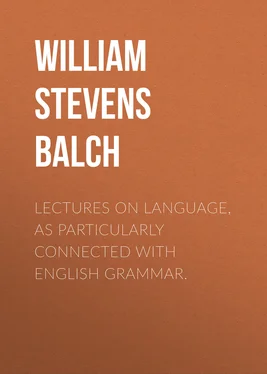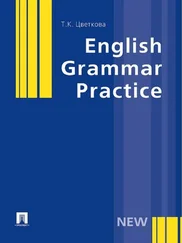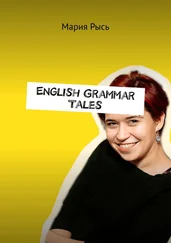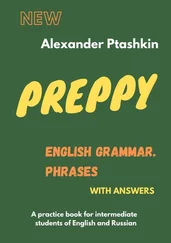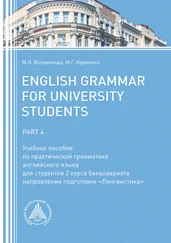William Stevens Balch - Lectures on Language, as Particularly Connected with English Grammar.
Здесь есть возможность читать онлайн «William Stevens Balch - Lectures on Language, as Particularly Connected with English Grammar.» — ознакомительный отрывок электронной книги совершенно бесплатно, а после прочтения отрывка купить полную версию. В некоторых случаях можно слушать аудио, скачать через торрент в формате fb2 и присутствует краткое содержание. Жанр: foreign_edu, foreign_language, на английском языке. Описание произведения, (предисловие) а так же отзывы посетителей доступны на портале библиотеки ЛибКат.
- Название:Lectures on Language, as Particularly Connected with English Grammar.
- Автор:
- Жанр:
- Год:неизвестен
- ISBN:нет данных
- Рейтинг книги:3 / 5. Голосов: 1
-
Избранное:Добавить в избранное
- Отзывы:
-
Ваша оценка:
- 60
- 1
- 2
- 3
- 4
- 5
Lectures on Language, as Particularly Connected with English Grammar.: краткое содержание, описание и аннотация
Предлагаем к чтению аннотацию, описание, краткое содержание или предисловие (зависит от того, что написал сам автор книги «Lectures on Language, as Particularly Connected with English Grammar.»). Если вы не нашли необходимую информацию о книге — напишите в комментариях, мы постараемся отыскать её.
Lectures on Language, as Particularly Connected with English Grammar. — читать онлайн ознакомительный отрывок
Ниже представлен текст книги, разбитый по страницам. Система сохранения места последней прочитанной страницы, позволяет с удобством читать онлайн бесплатно книгу «Lectures on Language, as Particularly Connected with English Grammar.», без необходимости каждый раз заново искать на чём Вы остановились. Поставьте закладку, и сможете в любой момент перейти на страницу, на которой закончили чтение.
Интервал:
Закладка:
Every word employed to designate things, or name them, is to be ranked in the class called nouns , or names. You have only to determine whether a word is used thus, to learn whether it belongs to this or some other class of words. Here let me repeat:
1. Things exist.
2. We conceive ideas of things.
3. We use sounds or signs to communicate these ideas to others.
4. We denominate the class of words thus used, nouns .
Perhaps I ought to stop here, or pass to another topic. But as these lectures are intended to be so plain that all can understand my meaning, I must indulge in a few more remarks before advancing farther.
In addition to individual, tangible objects, we conceive ideas of the qualities of things, and give names to such qualities, which become nouns . Thus, the hardness of iron, the heat of fire, the color of a rose, the bitterness of gall, the error of grammars. The following may serve to make my views more plain. Take two tumblers, the one half filled with water, the other with milk; mix them together. You can now talk of the milk in the water, or the water in the milk. Your ideas are distinct, tho the objects are so intimately blended, that they can not be separated. So with the qualities of things.
We also speak of mind, intellect, soul; but to them we can give no form, and of them paint no likeness. Yet we have ideas of them, and employ words to express them, which become nouns .
This accounts for the reason why the great Parent Intellect has strictly forbidden, in the decalogue, that a likeness of him should be constructed. His being and attributes are discoverable only thro the medium of his works and word. No man can see him and live. It would be the height of folly—it would be more—it would be blasphemy—to attempt to paint the likeness of him whose presence fills immensity—whose center is every where, and whose circumference is no where. The name of this Spirit or Being was held in the most profound reverence by the Jews, as we shall have occasion to mention when we come to treat of the verb to be.
We talk of angels, and have seen the unhallowed attempt to describe their likeness in the form of pictures, which display the fancy of the artist very finely, but give a miserable idea of those pure spirits who minister at the altar of God, and chant his praises in notes of the most unspeakable delight.
We have also seen death and the pale horse, the firy dragon, the mystery of Babylon, and such like things, represented on canvass; but they betoken more of human talent to depict the marvellous, than a strict regard for truth. Beelzebub, imps, and all Pandemonium, may be vividly imagined and finely arranged in fiction, and we can name them. Wizzards, witches, and fairies, may play their sportive tricks in the human brain, and receive names as tho they were real.
We also think and speak of the qualities and affections of the mind as well as matter, as wisdom, knowledge, virtue, vice, love, hatred, anger. Our conceptions in this case may be less distinct, but we have ideas, and use words to express them. There is, we confess, a greater liability to mistake and misunderstand when treating of mind and its qualities, than of matter. The reason is evident, people know less of it. Its operations are less distinct and more varying.
The child first sees material objects. It is taught to name them. It next learns the qualities of things; as the sweetness of sugar, the darkness of night, the beauty of flowers. From this it ascends by gradation to the higher attainments of knowledge as revealed in the empire of mind, as well as matter. Great care should be taken that this advancement be easy, natural, and thoro. It should be constantly impressed with the importance of obtaining clear and definite ideas of things, and never employ words till it has ideas to express; never name a thing of which it has no knowledge. This is ignorance.
It would be well, perhaps, to extend this remark to those older than children, in years, but less in real practical knowledge. The remark is of such general application, that no specification need be made, except to the case before us; to those affected proficients in grammar, whose only knowledge is the memory of words, which to them have no meanings, if, indeed, the writers themselves had any to express by them; a fact we regard as questionable, at best. There is hardly a teacher of grammar, whose self-esteem is not enormous, who will not confess himself ignorant on many of the important principles of language; that he has never understood, and could never explain them. He finds no difficulty in repeating what the books say, but if called upon to express an opinion of his own, he has none to give. He has learned and used words without knowing their meaning.
Children should be taught language as they are taught music. They should learn the simple tones on which the whole science depends. Distinct impressions of sounds should be made on their minds, and the characters which represent them should be inseparably associated with them. They will then learn tunes from the compositions of those sounds, as represented by notes. By dint of application, they will soon become familiar with these principles, if possessed of a talent for song, and may soon pass the acme with ease, accuracy, and rapidity. But there are those who may sing very prettily, and tolerably correct, who have never studied the first rudiments of music. But such can never become adepts in the science.
So there are those who use language correctly, who never saw the inside of a grammar book, and who never examined the principles on which it depends. But this, by no means, proves that it is better to sing by rote, than "with the understanding." These rudiments, however, should form the business of the nursery, rather than the grammar school. Every mother should labor to give distinct and forcible impressions of such things as she learns her children to name . She should carefully prevent them from employing words which have no meaning, and still more strictly should she guard them against attaching a wrong meaning to those they do use. In this way, the foundation for future knowledge and eminence, would be laid broad and deep. But I wander.
We attach names to imaginary things; as ghosts, genii, imps.
To this class belong the thirty thousand gods of the ancients, who were frequently represented by emblems significant of the characters attached to them. We employ words to name these imaginary things, so that we read and converse about them understandingly, tho our ideas may be exceedingly various.
Nouns are also used to express negation, of which no idea can be formed. In this case, the mind rests on what exists, and employs a word to express what does not. We speak of a hole in the paper. But we can form no idea of a hole , separated from the surrounding substances. Remove the parts of the paper till nothing is left, and then you may look in vain for the hole. It is not there. It never was. In the same way we use the words nothing, nobody, nonentity, vacuum, absence, space, blank, annihilation, and oblivion. These are relative terms, to be understood in reference to things which are known to exist. We must know of some thing before we can talk of no thing, of an entity before we can think of nonentity.
In a similar way we employ words to name actions, which are produced by the changes of objects. We speak of a race, of a flight, of a sitting or session, of a journey, of a ride, of a walk, of a residence, etc. In all these cases, the mind is fixed on the persons who performed these things. Take for example, a race. Of that, we can conceive no idea separate from the agent or object which ran the race . Without some other word to inform us we could not decide whether a horse race, a foot race, a boat race, the race of a mill, or some other race, was the object of remark. The same may be said of flight, for we read of the flight of birds, the flight of Mahommed, the flight of armies, and the flight of intellect.
Читать дальшеИнтервал:
Закладка:
Похожие книги на «Lectures on Language, as Particularly Connected with English Grammar.»
Представляем Вашему вниманию похожие книги на «Lectures on Language, as Particularly Connected with English Grammar.» списком для выбора. Мы отобрали схожую по названию и смыслу литературу в надежде предоставить читателям больше вариантов отыскать новые, интересные, ещё непрочитанные произведения.
Обсуждение, отзывы о книге «Lectures on Language, as Particularly Connected with English Grammar.» и просто собственные мнения читателей. Оставьте ваши комментарии, напишите, что Вы думаете о произведении, его смысле или главных героях. Укажите что конкретно понравилось, а что нет, и почему Вы так считаете.
